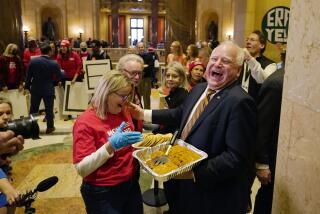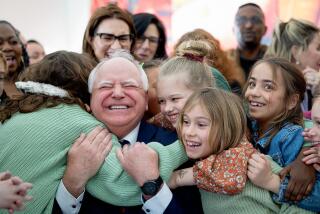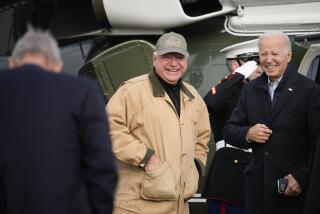A Low-Key Iowa Governor Receives the V.P. Treatment
SAN FRANCISCO — Here’s the thing about a vice presidential nomination. You’re not supposed to look like you’re pursuing it. It’s considered best to lie low and let the job come to you.
So when Iowa Gov. Tom Vilsack -- one of the top prospects to join Sen. John F. Kerry on the Democratic ticket -- came to San Francisco last week for a biotechnology conference, he relentlessly maintained just one identity, as governor of a small Midwestern state.
On the floor of the Moscone Convention Center, a Japanese trade representative yakked to Vilsack about his chances of making it to Washington. The governor’s response: He couldn’t wait to see the booths featuring Japanese biotech firms.
At a breakfast meeting, a reporter looked at the crowded room and said that people must have wanted to catch a glimpse of a vice presidential candidate.
“Oh,” Vilsack quipped, “is Dick Cheney going to be here?”
And at a nighttime cocktail party for Iowa expatriates, the home folks were free to spin out Washington fantasies and Beltway dreams. The governor, however, aw-shucksed his way free of all the speculation.
“It’s not about me,” he told one woman. “It’s about Iowa.”
Thomas J. Vilsack holds the distinction of being perhaps the least known of the noncandidate-candidates being seriously scrutinized by the Kerry campaign as a potential vice presidential running mate.
Only Vilsack, Rep. Dick Gephardt of Missouri and Sen. John Edwards of North Carolina are known to be on the Kerry short list -- subject to painstaking reviews of both their personal and political records.
So, why Vilsack?
Allies suggest he would be a bright and articulate spokesman for Democrats, a fresh face to inspire some media buzz but not so sparkling (like the glib and handsome Edwards) as to steal the limelight from Kerry.
He also has the sort of dramatic biography that television and newspaper reporters love: orphaned at birth, then adopted as an infant by a well-to-do Pittsburgh couple. He managed to transcend physical abuse by his alcoholic mother to build a successful career in law and politics.
“He has a great personal story -- a difficult childhood he overcame,” said Lisette Lehman, a onetime Iowan who greeted Vilsack at the San Francisco cocktail party last week. “And being from the Midwest, that might be a nice balance with Kerry being from the East and from a different background.”
*
A somewhat hulking man who played high school football, Vilsack, 53, has sloping shoulders and thick fingers. He is soft-spoken but assertive.
Kerry is said to like the former lawyer and small-town mayor. They share a passion for the details of public policy. And the Vilsacks won a place in Kerry’s heart in January.
Just days before balloting in the Iowa caucuses, Iowa First Lady Christie Vilsack strode onto the snowy steps of the state Capitol in Des Moines and said she trusted Kerry to keep America safe. The endorsement was widely seen in Iowa as helping the Massachusetts senator come from behind to win.
Another contender for the vice presidential nomination now says privately that Vilsack might be the favorite because of his small-town charm and his amiable relationship with the presumptive presidential nominee. Unlike Gephardt and Edwards, he would offer the ticket outside-the-Beltway balance. One of Vilsack’s aides confided that he thought that the selection had narrowed to his boss and Edwards.
But all that does not change the fact that Vilsack’s name and face are a mystery to most Americans. His state, assuming he can deliver it, offers only seven electoral votes.
Perhaps most importantly, Vilsack has limited foreign policy experience. At a time when the U.S. is still at war in Iraq and concerned about the threat of terrorism at home, Kerry may opt for a partner with a more worldly resume.
Only Kerry and one or two close advisors have any idea who might be chosen to help the presumptive nominee take on President Bush and Vice President Dick Cheney. Dozens of candidates have been mentioned; none officially ruled out.
Besides a sudden platform on the national stage, a vice presidential nomination would provide Vilsack with a heaping helping of derision from his Republican opponents. They would likely attack his proposal this year to increase taxes -- on cigarettes and on some services that don’t fall under the Iowa state sales tax.
And his plan to recruit 310,000 foreign workers to Iowa -- because state unemployment is now less than 4% -- might also draw criticism.
Democrats, in contrast, would stress Vilsack’s successes as governor: lowering public school class sizes, making more children eligible for healthcare and promoting economic development through the Iowa Values Fund.
Several interest groups would find comfort in the Vilsack record. He has supported abortion rights and increased pay for teachers. He pushed for a hike in Iowa’s minimum wage and issued an executive order banning discrimination against gays and lesbians -- the latter move subsequently overturned by the state Legislature.
The tough economy has made it hard for Vilsack, Iowa’s first Democratic governor in 30 years, to maintain his standing. His approval rating dropped this spring below 50%, according to a Des Moines Register poll.
*
Strolling through the San Francisco convention center last week, however, the governor seemed decidedly unfettered by any feuding back home and devoid of the self-important air that sometimes comes with public office. He stepped aside to let others on escalators. When he needed a free hand to take some notes, he politely asked one of the state troopers accompanying him whether he would mind holding the governor’s bottle of drinking water.
Christie Vilsack, a 30-year veteran public school teacher and a popular figure in Iowa, shares her husband’s just-folks style. She says Iowans are taught from a young age not to blow their own horns.
The Vilsacks played the roles of international ambassadors through much of their short stay in San Francisco. At a morning breakfast gathering, they greeted bio-entrepreneurs and journalists from 20 nations.
Later in the day, a Japanese delegation welcomed the couple. The governor received a stream of gifts and responded with arigatos and multiple bows.
Vilsack spoke in detail about the glowing prospects for Iowa’s biotech industry as he stopped by many of the 20 booths in the convention’s Iowa pavilion.
One company is attempting to develop a vaccine for breast and lung cancer and another hopes to isolate the protein in peanuts that causes allergic reactions.
Even the corn kernel -- “the Tupperware of nature!” Vilsack proclaimed -- and its 3,500 potential derivative products came in for a stirring endorsement.
When he told reporters at a news conference about the humanitarian benefits of the scientific boom, he won over at least one onlooker.
“This guy is good,” Lynne Osterman, a Republican legislator from Minnesota, whispered to her colleagues. “He’s really good.”
Asked, undoubtedly for the umpteenth time, if he would like to be vice president, Vilsack responded: “I am not focused on hypothetical questions. I am focused on doing my job.”
But he made sure to offer a strong rebuttal when a reporter suggested he might not have the foreign policy experience needed to serve in the White House. First, Vilsack exhaustively recapped his gubernatorial travels, which have taken him to places such as Nigeria, South Africa, Japan, China, New Zealand and Europe.
“The governors are very much focused on the implementation of homeland security,” Vilsack added. “And so I’m not so sure there is any single qualification or requirement” to be vice president.
*
But a vice presidential nomination would mean more scrutiny of his foreign policy credentials, not to mention his up-from-nowhere beginnings, his law career and long-ago newspaper columns.
Vilsack attended a small liberal arts college and then law school in upstate New York, where he met Christie. After receiving his law degree in 1975, he moved to Iowa -- following his wife back to her hometown of Mount Pleasant.
Christie Vilsack said she knew her husband had truly become an Iowan years later, when he began to end his sentences with prepositions, as in: “Where are you at?”
It was in Mount Pleasant that the young lawyer launched his political career as mayor in 1987. And it’s there that Kerry’s veep screeners focused some of their initial attention -- on dozens of columns Vilsack wrote for the Mount Pleasant News.
All that history might have seemed far away last week, though, as Vilsack and about 200 Iowa expatriates gathered on the 52nd floor of San Francisco’s Bank of America building. As the sun set behind the Golden Gate Bridge, the governor asked the crowd of doctors, lawyers and business people to think about coming back home. After all, he noted, independent surveys recently picked Iowa as home of some of the nation’s best public schools and as No. 1 in caring for its citizens.
When he finished, a guest or two said they planned to move back to Iowa. But many more told Vilsack they hoped he, too, would join the exodus -- in his case, with a ticket punched for Washington.
“I think of the United States as a bunch of small towns and a few big cities,” said Susan Nicholas, who went to medical school in Iowa and is now a cardiac surgery resident at UC San Francisco Medical Center. “He represents one of those small towns -- that voice.”
But when Nicholas gushed to Vilsack that she was sure he was headed for a vice presidential nomination, the governor would not be moved.
“Yeah?” he said, smiling. “Who’d you hear that from?”
*
(BEGIN TEXT OF INFOBOX)
Tom Vilsack
Age: 53
Occupation: Governor of Iowa
Birthplace: Pittsburgh
Education: Bachelor of arts in history from Hamilton College in Clinton, N.Y., 1972; law degree from Albany Law School, N.Y., 1975.
Career: Practiced law from 1975 to 1998. Mayor of Mount Pleasant, Iowa, from 1987 to 1992. Iowa state senator from 1992 to 1998. Elected governor in 1998; reelected in 2002.
Family: Wife, Christie; two sons, Jess, 26, and Doug, 23.
Los Angeles Times











